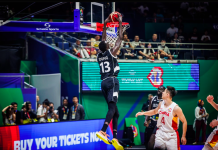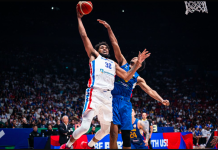China pipped Philippines for the rights to host the 2019 FIBA Basketball World Cup, in an announcement on Friday.
The Chinese won with 14 winning votes to Philippines’ seven.
FIBA’s Central Board met in Tokyo and came to their final decision based on four factors: vision along with concept, experience in hosting events, basketball history and venues.
And led by an informative and solid pitch by retired NBA big man Yao Ming, the greater infrastructure and experience in hosting major sporting events, including the 2008 Olympics and numerous FIBA Asia events, added with the largest market ever for the promotion of the tournament was enough to put the Board’s full confidence in China as it can now prepare for basketball’s world audience in the summer of 2019.
It’s such an exciting moment to bring the 2019 FIBA Basketball World Cup to China and I’m sure that millions of fans are sharing this joy with us,” said Yao following the announcement.
“We have to pay tribute to the Philippines delegation. They were great opponents. Only opponents like them could really push us to our limits to test how capable we are. Even if we were opponents on this occasion, we still have a friendship with them.
“I know what it’s like to play a top level basketball tournament in front of home fans because I played at the 2008 Beijing Olympics. Having the 2019 FIBA Basketball World Cup will inspire a lot of people and particularly more young athletes to participate in basketball.”
China edged out an enthusiastic, intensely passionate and proud pitch by the Philippines, fronted by the social media campaign #Puso2019 that was the number one trending topic worldwide during the country’s final speech. Philippines stated to the basketball world that hosting the World Cup wasn’t just another sporting event to them, it is the event.
Oh hi @FIBA! Look whats #1 trending worldwide 👍🏼😜🏀❤️ #PUSO2019 pic.twitter.com/XuB1D18MPh
— TJ Manotoc (@tjmanotoc) August 7, 2015
Led by veteran guard Jimmy Alapag, coach Chot Reyes and a video package that featured a message from boxer Manny Pacquiao, the basketball-mad nation stated that they would host the biggest basketball party in four years time.
But it wasn’t to be.
FIBA’s flagship event in 2019 will feature 32 teams for the first time ever. It will be the first World Cup played under FIBA’s new system of competition that comes into play in 2017, which entails an 15-month qualifying process taking place from November 2017 to February 2019.
OPINION
The heart of every basketball fan around the world wanted the Philippines to be awarded the 2019 FIBA World Cup – and sure enough – when the announcement went against them and in favour of China, a lot were left disappointed.
But, in the grand scheme of things and especially how FIBA announced what criteria was to be used in awarding the World Cup, this was a no-brainer.

China’s final pitch was based on a far superior promotional market, where a population of 1.3 billion offers the 2019 FIBA World Cup unlimited potential, a near unrivalled economy, where the tournament can attract the biggest sponsors and a vast history of hosting key sporting events.
Philippines were unanimously the people’s choice and out of the two 25-minute speeches, were by far the most enthusiastic. They sold their candidacy fantastically and even during their final pitch the hashtag PUSO2019 was the number one trending topic on Twitter, illustrating the love that the Philippines has for social media and basketball.
But, popularity alone can not beat sustainability and a bigger market to promote a product. While Philippines were the people’s choice for the candidacy, China has the brains and the experience to stage this event.
Some could even go as far to say that that ‘money talks’ and that China ‘bought’ their way into hosting the 2019 World Cup but of the main points: vision, concept, experience in hosting events, basketball history and venues; with the exception of vision, China has the edge on Philippines on the other four.

















